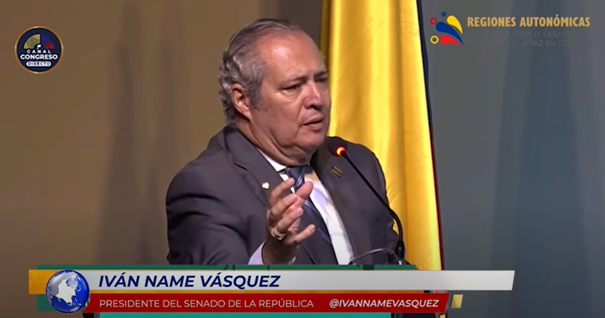
During the Third Public Hearing on Autonomous Regions, Colombian business and political figures called for increased decentralization in Colombia, discussing the country’s current social, political and economic challenges and how decentralization could be a suitable solution. Held in Medellin on March 14, 2024, the event was organized by Ivan Name Vasquez, the President of the Colombian Senate, as part of the “National Plan of Development 2022-2026” (Plan Nacional de Desarrollo 2022-2026), which aims to decentralize the Colombian state.
Decentralization in Colombia
Decentralization has been a longstanding debate in Colombia, with various initiatives aimed at achieving this goal. Initially, academic contributions such as the Lebret Report, produced by the Lebret mission led by a French priest from 1954 to 1956, along with the 1969 study by educationist Miguel Fornaguera and geographer Ernesto Guhl, advocated for regionalization in Colombia.
This concept was later revisited and progressively adopted by the Colombian State. In 1984, the National Department of Planification (Departamento Nacional de Planeacion) segmented the country into five Regional Councils of Economic and Social Planification (CRPES), and in 1991, the Constitutional Assembly defined the Colombian State as a “Unitary Republic, Decentralized and with autonomy for its territorial entities”.
Public Hearing on Autonomous Regions
However, many political and business figures have criticized the incomplete execution of the regionalization process, advocating for further decentralization.
To address these concerns, Ivan Name Vasquez, President of the Colombian Senate, initiated a series of Public Hearings on Autonomous Regions, with the inaugural session taking place in Barranquilla, on December, 18, 2023. The project’s goal is to alter Colombia’s geopolitical framework by increasing decentralization and providing more economic autonomy for the country’s regions, essentially diminishing the State’s control over resource management and the decision-making process.
The Medellin session on March, 14, 2024, attracted key Colombian political and business figures, such as Frank Pearl, president of the Colombian Association of Petroleum and Gas, Andres Julian Rendon, Governor of the Antioquia department, Jorge Ivan Bula Escobar, President of the prestigious School of Public Administration, representatives from the National Federation of Business Traders (FENALCO) and numerous members of the Chamber of Representatives and Senate from various political parties.
Advocacy for decentralization in Colombia
During the session, the President of the Senate presented a legislative act proposal aimed at enhancing decentralization in Colombia. Introduced by the En Marcha political party, the project suggests a reform of the General System of Participations (Sistema General de Participaciones – SGP), which is the mechanism through which the State redistributes resources, hence intending to increase the revenues of local entities. As such, the allocation of resources to districts and municipalities is planned to rise from the current 20 percent to 46.5 percent by 2034.
A critical issue in Colombia is the significant concentration of wealth and development in a limited number of departments and cities. As highlighted by Maria Bibiana Botero, president of the regional development organization Proantioquia, the cities of Bogota, Medellin, Cali, Barranquilla and Bucaramanga alone account for approximately 69 percent of the national GDP and 79 percent of its industry.
Indeed, speakers of the event criticized the current state-managed resource redistribution system as inefficient. Ivan Name Vasquez, for example, cited the case of Arauca State, which, despite its considerable oil resources and production, remains among the country’s poorest.
Furthermore, significant criticism arose from political figures from the Antioquia Department, which contributes to 14.5 percent of the Colombian GDP, arguing that the current redistribution system is unfair towards their department.
Regionalism in Colombia
Regionalism is a strong feature of Colombian political life. Far from being just a cultural rivalry, regionalism is rooted in perceived or actual historical grievances, with regions like the Pacific and Caribbean Coasts arguing that the Colombian State has always favored the Andean Regions, such as Antioquia and Cundinamarca Departments. As such, Gustavo Petro, originating from the Caribbean Coast, has been seeking to “rectify” what he perceives as a historical injustice.
Indeed, in a recent controversy, President Gustavo Petro announced the freezing of funds allocated to the Fourth Generation Roadways (colloquially known as Vias 4G), which are intended to connect the Department with neighboring regions and improve mobility, despite the project’s 96 percent completion rate. This decision led to a public exchange of statements between President Petro and former President Alvaro Uribe, and even revived the marginal Antioquian independence movement, a sign that regionalism is a serious matter in Colombia.
With the Colombian Congress establishing a Commission on “Autonomous Regions and Development Drive for Colombia”, decentralization has become an increasingly active political agenda in the country. As such, a new Public Hearing is set to take place on April 5th, 2024, in Ibagué.
See all the latest news from Colombia and the world at ColombiaOne.com. Contact our newsroom to report an update or send your story, photos and videos. Follow Colombia One on Google News, Facebook, Instagram, and subscribe here to our newsletter.

